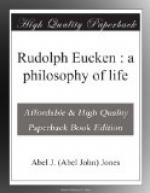Eucken emphasises that the historical basis of Christianity is not Christianity itself, is not essentially religious; and he quotes Lessing, Kant, and Fichte to support him in his contention that a belief in such a historical basis is not necessary to religion, and may even prove harmful to it. The historical basis is, of course, useful as bringing out into clear relief the personality of Jesus, and the other great spiritual personalities associated in His work, and Eucken lays stress upon the use that history can be to Christianity in giving records of the experiences of great spiritual personalities in all ages, but it is important that the history is here a means to an end, and not an end in itself, and that the importance lies in the spiritual experience and not in the historical facts.
When one considers how little Eucken has to say concerning worship, and how little emphasis he places upon historical and doctrinal forms in religion, one wonders how it is he attaches so much importance to the functions of the Church. He points out that a Church is necessary to religion, that it seems to be the only way of making religion real and effective for man. “The Church seems indispensable in order to introduce and to hold at hand the new world and the new life to man in the midst of his ordinary existence; it is indispensable in order to fortify the conviction and to strengthen the energy in the midst of all the opposite collisions; it is indispensable in order to uphold an eternal truth and a universal problem in the midst of the fleetingness of the moment.” In the past, however, much harm has been done to religion by the Church. This has arisen from several reasons. To begin with, it tends to narrow religion, which is concerned with life, to the realm of ideas, and to tie down religion by connecting it with a thought-system of a particular age. Further, the necessary mechanical routine, and the appointment of special persons to carry out this routine, tends to elevate the routine and these special persons to a far higher place than they should occupy. Again, spiritual things have been dragged into the service of personal ambition, and bound up with human interests. The most serious danger, however, is that religion, from being an inward matter, tends to become externalised.
Despite this, an organised Church cannot be dispensed with, and Eucken points out what changes are necessary to make the Church effective. One important point he makes clear, namely, that as the Church must speak to all, and every day, and not only to spiritually distinguished souls, and in moments of elevated feeling, then the teaching of the Church will always lag behind religion itself, and must be considered as an inadequate expression of it.
It is necessary that there should be no coercion with regard to men’s attitude towards the Church, and men should be free to join this or that Church, or no Church at all.




